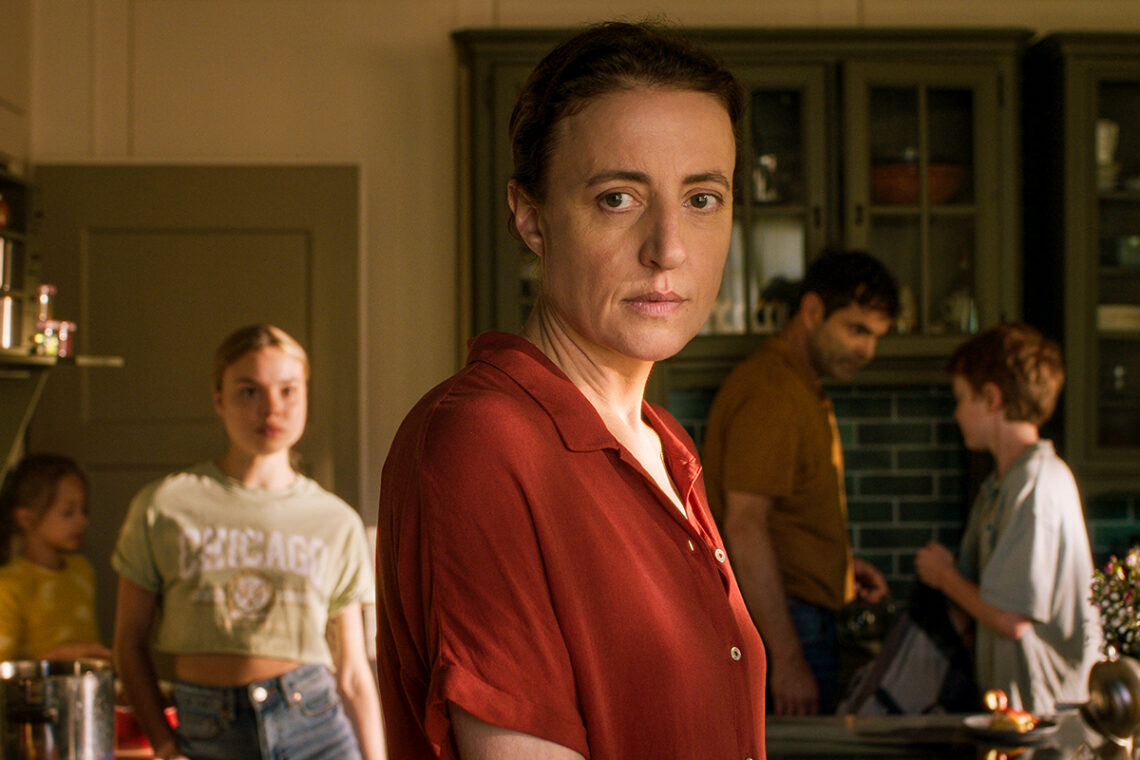The opening frame of “The Sparrow in the Chimney” evokes a kind of art-directed ideal of country living: In a spacious, rustically textured farmhouse kitchen, mid-afternoon sunlight pours in through open windows so large they double as French doors, looking out onto rolling, summer-kissed lawns and hazy woods beyond. A regal ginger cat slinks in over the sill, as amplified birdsong and insect chatter also seem to blur the indoor-outdoor boundary. A casserole simmers patiently on the stove. Who wouldn’t want to live like this? Pretty much everyone, it turns out, in Ramon and Silvan Zürcher’s elegantly vicious domestic horror movie, which forensically unpicks the compacted resentments, betrayals and traumas underpinning a single weekend family gathering, with a touch as icy as the lighting is consistently, relentlessly warm. The Zürcher twins — who take a joint “a film by” credit on all their work, though only Ramon is billed here as writer, director and editor, with Silvan as producer — have a knack for probing inviting household spaces in a way that renders them unfamiliar, even alien. Their 2013 debut “The Strange Little Cat” observed the everyday routines of an ordinary family from a distance that turned their movements into droll physical comedy, while 2021’s “The Girl and the Spider” located whispers of the uncanny in the back-and-forth of a young woman’s apartment move. The third film in the Zürchers’ “animal trilogy,” “The Sparrow and the Chimney” marries that same detached observational quality and fey sense of the absurd to a more elaborately fleshed-out narrative, crackling with melodramatic danger and intensity of feeling. This increased dramatic heft could earn this Locarno competition entry the broader arthouse exposure that has eluded the Zürchers’ previous work, despite their ardent critical following. Popular on Variety The “animal” aspect of the trilogy isn’t incidental. Throughout “The Sparrow and the Chimney,” the natural world encroaches on human life in ways that don’t feel invasive so much as equalizing, as social conventions and restraints are gradually shed in favor of brute base instincts. The first innocuous sign of this collapse is, well, a sparrow caught in the fireplace of the rambling rural house where Karen (“I’m Your Man” star Maren Eggert) grew up, and is now raising her own gradually dispersing family. The bird is freed, in a dusty flurry of flight, by Karen’s lonely pre-adolescent son Leon (Ilja Bultmann); over the next two hours, few will make quite such a lucky escape. Karen’s consistently stiff, stricken expression is the first clue that all is not rosy in this apparent idyll. When her younger, cheerier sister Jule (Britta Hammelstein) arrives to stay the weekend, with her husband Jurek (Milian Zerzawy) and daughter Edda (Luana Greco) in tow, Karen has to be pulled into a hug, as if her body has forgotten how. When Karen’s eldest daughter Christina (Paula Schindler) joins them from college, too, there’s an anxious void where an embrace should be. Meanwhile, her highschooler daughter Johanna (a scorching Lea Zoe Voss) wouldn’t touch her mother if her life depended on it: A self-styled Lolita who yearns to escape the nest, she radiates above-it-all hostility toward the world in general, but saves a special white-hot reserve of hatred for Karen. That’s beginning to rub off on cherubic Leon, a precocious gourmet (and vulnerable mark for local bullies) who cooks the family’s meals but doesn’t eat them. The occasion for this family gathering is the birthday of Karen’s husband Markus (Andreas Döhler), though he’s not much in a mood for revelry either — he’d rather quietly continue his dalliance with the family’s young dog walker Liv (Luise Heyer), who lives in a cottage across the way, and has an alleged history of mental illness and arson. Thus are all the elements lined up for a quasi-Chekhovian knockdown battle of competing desires and miseries, though not every conflict plays out exactly as you might predict: Some aggrieved characters passively watch when you expect them to strike, while others resort to stark acts of violence without obvious provocation. The most aggressive presence here, meanwhile, may be a phantom one: Karen and Jule’s late mother, remembered rather differently by the two sisters, who still wields control over a house to which Karen feels oppressively obligated, while Jule was all too happy to wash her hands of it. Zürcher’s script balances the excavation of long-buried secrets against a steady stream of present-tense confrontations and revelations, as does his limber, darting editing — while Eggert’s tensely still, hollowed-out performance, as a matriarch increasingly inclined to walk away from familial chaos, is a stabilizing anchor amid all this narrative sturm und drang. The remaining ensemble deftly rolls with the film’s volatile tonal shifts. There’s more broad, barbed comedy in their collective interactions, and occasional, devastating tenderness when they get each other alone — as in one exquisite scene where Christina, despite her recent absence, reads her younger brother’s inner life so acutely as to make him feel, at least for a moment, less alone in it. “The Sparrow in the Chimney” may be a crowded work, sparking and seizing with nervous energy, but there’s a mutually enhancing tension between the rough-and-tumble of the drama and the refinement of the filmmaking. Characters seem to veritably chafe against the poise and gilded beauty of DP Alex Hasskerl’s immaculate compositions, and they sometimes strain to be heard over the intricate sound design, with its symphonic melding of human rhubarb and the hum, traffic and weather of the outdoors. Nearby, a lake and island where Karen’s children once swam has been taken over by intimidating cormorants, possessively guarding a spot they’re no longer willing to share; perhaps the time has come for this fevered, fractured house to cede itself to the elements.

 English
English




